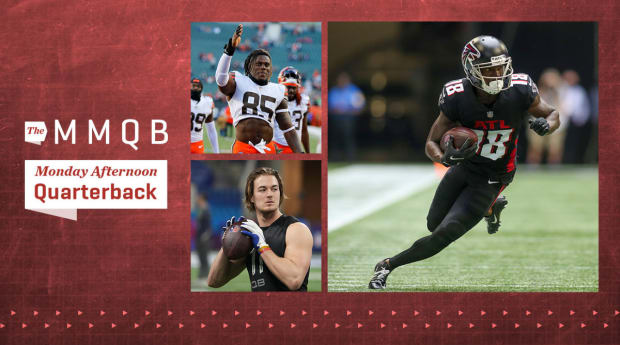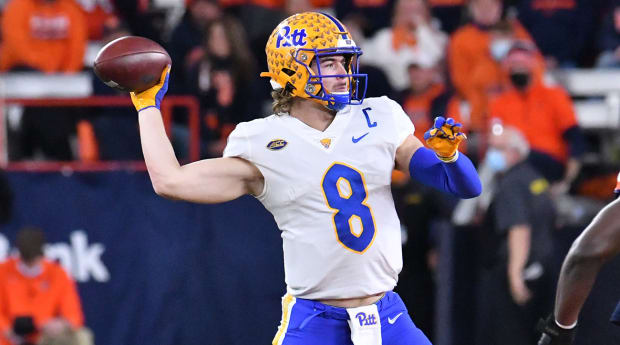Players can’t bet on games in the leagues they play in. And every NFL player knows the rule.
I’m back home from the combine now, and the offseason rolls on …

Brett Davis/USA TODAY Sports (Ridley); Joseph Maiorana/USA TODAY Sports (Njoku); Kirby Lee/USA TODAY Sports (Pickett)
• I promise you, the reason the NFL had to come down on Calvin Ridley isn’t complicated.
All a pro sports league has is the integrity of its product—if doubt is cast that its games are on the level, then the NFL is the WWE (no offense to the WWE). Allowing for players to gamble on games doesn’t just open the possibility that a guy could throw a game. It also cracks the insider trading Pandora’s Box. It invites the wise guys into the room. So, yeah, green-lighting a player lighting up a gambling app with NFL bets … bad idea.
Now, based on the ongoing legalization of sports betting across the U.S., I can understand if someone believes that an NFL player should be able to wager on, say, a fight or an NBA game. Especially since the league itself is lining its pockets with casino and daily-fantasy money. But allowing a player to bet on a league he doesn’t play in is much different than allowing him to bet on one he does.
So spare me the sympathy for Ridley. He knew. There are massive signs in every NFL locker room that remind players every day they can’t bet; trust me, I’ve seen them. If you miss them, or all the other reminders the league and teams have given, then it’s on you. And this is 100% on Ridley himself.
Here, then, is how it went down. … Ridley landed on the NFI list, after leaving the Falcons for mental health reasons, on Nov. 5. He placed a series of bets from Nov. 23 to 28 in Florida through the Hard Rock Sportsbook app, which at the time was the only sports betting app legal in the state. The bets were made through his cell phone, and that he was out of state, and betting through his phone, helped Genius, a compliance company the NFL contracted last year to monitor this stuff, flag and ultimately bust Ridley.
The Falcons were informed of the investigation on Feb. 9 and fully cooperated with the league, while stonewalling teams that showed interest in trading for him. As part of the process, the NFL found that no Atlanta players, staff or coaches had any idea of Ridley’s activity. Ridley said on Twitter he bet $1,500. The NFL found fewer than 10 bets, including three-, five- and eight-game parlays. He had bet on, but not against, the Falcons.
Where does this go from here? Obviously, for the NFL, this will raise questions on its partnerships and how it handles gambling with its players going forward (again, there’s no way they’d ever allow players to gamble on NFL games). As for Ridley, he can apply for reinstatement on Feb. 15, 2023.
And I guess my conclusion here? Once sports gambling came out of the darkness and into the light, with many states legalizing it over the last few years, that light shining on an active player at some point was inevitable.
• That the Browns tagged David Njoku should surprise no one—and it’s not so much about his overall value to Cleveland as it is where his number projects. Tight ends are relatively inexpensive to begin with (the highest paid guy, George Kittle, is at $15 million per year), and thus the tag figure is usually incredibly affordable, with his year being no exception. Njoku’s absolutely is, at just $10.9 million. Only running back and kicker/punter will have a lower number. So the Browns can preserve exclusive negotiating rights with their 25-year-old tight end and try to work out a long-term deal, which could allow for some more roster management to save on the cap. Now, Njoku hasn’t quite lived up to expectations since he was drafted in the first round in 2017. But this move makes sense.
• We touched on another player franchised on Monday, Bengals S Jessie Bates, in the morning column. His tag number is $12.9 million. This is a big one for Cincinnati, and Bates is seeking a top-of-the-market deal (Jamal Adams’s deal, signed last year, is worth $70 million over four years, which is $17.5 million per). And it’s a big one not just because of his value to the team, but because he’s a leader there, and how the team handles his situation figures to resonate in a locker room that’s got a few young guys who’ll be at the table looking for similar paydays over the next couple of years.
• For posterity’s sake, here are the franchise and transition tag numbers—the NFL distributed them to teams Monday afternoon.
Franchise players:
Quarterback: $29,703,000
Running back: $9,570,000
Wide receiver: $18,419,000
Tight end: $10,931,000
Offensive lineman: $16,662,000
Defensive end: $17,859,000
Defensive tackle: $17,396,000
Linebacker: $18,702,000
Cornerback: $17,287,000
Safety: $12,911,000
Kicker/punter: $5,220,000
Transition players:
Quarterback: $27,186,000
Running back: $8,034,000
Wide receiver: $16,782,000
Tight end: $9,392,000
Offensive lineman: $15,348,000
Defensive end: $16,012,000
Defensive tackle: $14,716,000
Linebacker: $15,783,000
Cornerback: $15,167,000
Safety: $10,817,000
Kicker/punter: $4,701,000
• Michigan’s edge rusher Aidan Hutchinson was nice enough to give me his own personal player comp, when I asked if there’s someone in the NFL he’s tried to model his game after: “This may be a little basic, but I would just say T.J. [Watt]. Just the way he rushes the passer, how relentless he is, and getting 22.5 sacks this year is fricking impressive. I definitely want to be putting up those numbers by the time I get there.” It’s an interesting comp, too, because Hutchinson played standing up way more as a senior, in Mike Macdonald’s Ravens–inspired scheme, than he had his first three years, when he had his hand on the ground at pretty much all times, and even reduced down to a tackle spot in the Wolverines’ nickel.

Mark Konezny/USA TODAY Sports
• On Pitt QB Kenny Pickett, let’s start here: His hand size is an issue for at least some teams. Only one NFL starter is under 9", and that’s Taysom Hill—who measured 8.75", plays indoors and might or not wind up being the Saints’ starter in the fall. Pickett came in at 8.5". Is it a death knell? No, it’s not. But it’s not irrelevant, particularly for teams that play in cold weather. That said, as was expected, Pickett was outstanding in his interviews. And so the bigger question, whether his ceiling is high enough to give a team a chance to compete with the Allens and Mahomeses of the NFL over the next decade, is the same coming out of the combine as it was going in.
• I talked to one defensive coach on Monday who was pretty interested in the fate of Notre Dame S Kyle Hamilton and Cincinnati CB Sauce Gardner—since both guys are taller than what you’d normally see in the secondary. The former is 6' 4", the latter is 6' 3". The former ran just 4.59 in the 40, and the aforementioned coach thought Gardner looked a little stiff in movement drills. For these reasons, I do think there may be some variance of opinion on the two, both of whom are good bets to go inside the top 10. Is Hamilton better off at linebacker? Does Gardner fit all schemes? These questions will get asked in draft rooms.
• The attrition in the Patriots’ organization was apparent to those in Indianapolis over the last week, and maybe nowhere more so than in free-agent meetings with player agents. New England sent pro scout Marshall Oium to handle at least some of those. Oium has been with the team for four years—the former futures trader and Univ. of Chicago alum was poached from the Browns in 2018. And in some of those meetings, agents told me they heard a Patriots group that might’ve been a bit disconnected with reality, telling agents that while they’re not willing to go to where their top clients want to financially, to keep them in mind in case the market craters and they need to do shorter deals. For years, this approach worked for New England, because it could offer a player the chance to come in on, say, a one-year deal and reestablish his stock, playing with Tom Brady and for Bill Belichick. Now? Much better opportunity in that regard exists for players in places like Kansas City and Buffalo.
• Happy trails to retiring Colts TE Jack Doyle, who’s just a phenomenal story—an Indiana kid who signed with the team out of Western Kentucky as an undrafted free agent, made it and carved out an excellent career for himself. Coach Frank Reich and GM Chris Ballard identified him early on as the type of player they wanted to build their culture around, so Doyle’s been valuable to those two, and their program, well beyond all the catches he made, yards he grinded out and blocks he threw.
• Tuesday is an interesting checkpoint for the Aaron Rodgers saga—with the Packers having to make a final call on franchising Davante Adams. We’ll see if it’s enough to get a decision out of the quarterback. Like I said in the morning column, I believe, because of the relationships he has with guys like Adams, he’ll be coming back for an 18th season as a Packer, and probably doing it with a brand-new contract.